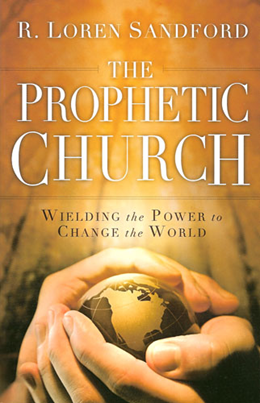Loren Sandford: The Prophetic Church
 R. Loren Sandford, The Prophetic Church: Wielding the Power to Change the World (Grand Rapids: Baker, 2009), 218 pages, ISBN 9780800794620.
R. Loren Sandford, The Prophetic Church: Wielding the Power to Change the World (Grand Rapids: Baker, 2009), 218 pages, ISBN 9780800794620.
Loren Sandford, senior pastor of New Song Fellowship, is a graduate of Fuller Theological Seminary and a widely recognized leader within the charismatic renewal. He has authored several books, and written, produced, and recorded several music CDs. This monograph, The Prophetic Church, comes at the heels of a transition in the prophetic streams of the renewal movements. As the prophetic outpouring revivals of the nineties waned, new prophetic ministries have come to the fore. As his title begs the question, Sandford’s thesis argues that intimacy with God is the power and primary mark of the prophetic church to be a light in this generation (18). He argues that “a season of the emergence of lighthouse churches and ministries is now upon us” (16). Sandford’s symbolic writing style, combined with numerous biblical examples provides the reader with vivid images to conceptualize the major thrusts of his proposal. The author’s themes build together to communicate his thesis.
Sandford opens by making bold proclamations regarding an ensuing revival in the church of the Western world. However, he conveys with sadness that the revival will stop short of creating a cultural change or lasting impact on secular society. He supports this premise based upon a hermeneutic in which he utilizes biblical narrative to support end time events and then applies these interpretations to the current state of affairs. He records a few of the historical outpouring events of the nineties by giving account of the Toronto Blessing, Brownsville, Smithton, and Pasadena revivals. Sandford argues that the subsequent rejection of these outpourings by the church, degradation of morality as it relates to God in society and liberal views regarding doctrine and authority of Scripture within the church, have caused an irreversible judgment or course within society that will prevent revival from pervading the current culture (13─16).
A season of the emergence of lighthouse churches and ministries is now upon us.”
— Loren Sandford
Sandford highlights the destiny of the prophetic church in part three. He describes this destiny through a Daniel-Joseph anointing motif and the characteristics of the life of Moses as “force multipliers” (101). He defines this concept of force multipliers as factors which seek to “dramatically increase the effectiveness” of something which already exists (187). The writer’s use of exhortation is befitting to build up the ideas of a bold and faithful community, ready to serve, and shining as the light in the darkness as a result of the their participation with these force multipliers. Part four transitions the reader into a counter-cultural theme of the meanings and biblical importance of honor. He links this culture of honor with the release of God’s power and provides several biblical narratives to demonstrate the correlation. After a short excerpt on the importance of faith, Sandford writes to the issues of prophetic prayer and praise. In this chapter, a prophetic church is described as one who knows its identity, position, and prays and praises with declarative statements which builds an atmosphere of faith. The latter theological concepts are familiar to the various streams within the Word of Faith Movement. However, they may seem somewhat foreign for the evangelical reader.
Category: Spirit, Summer 2011


